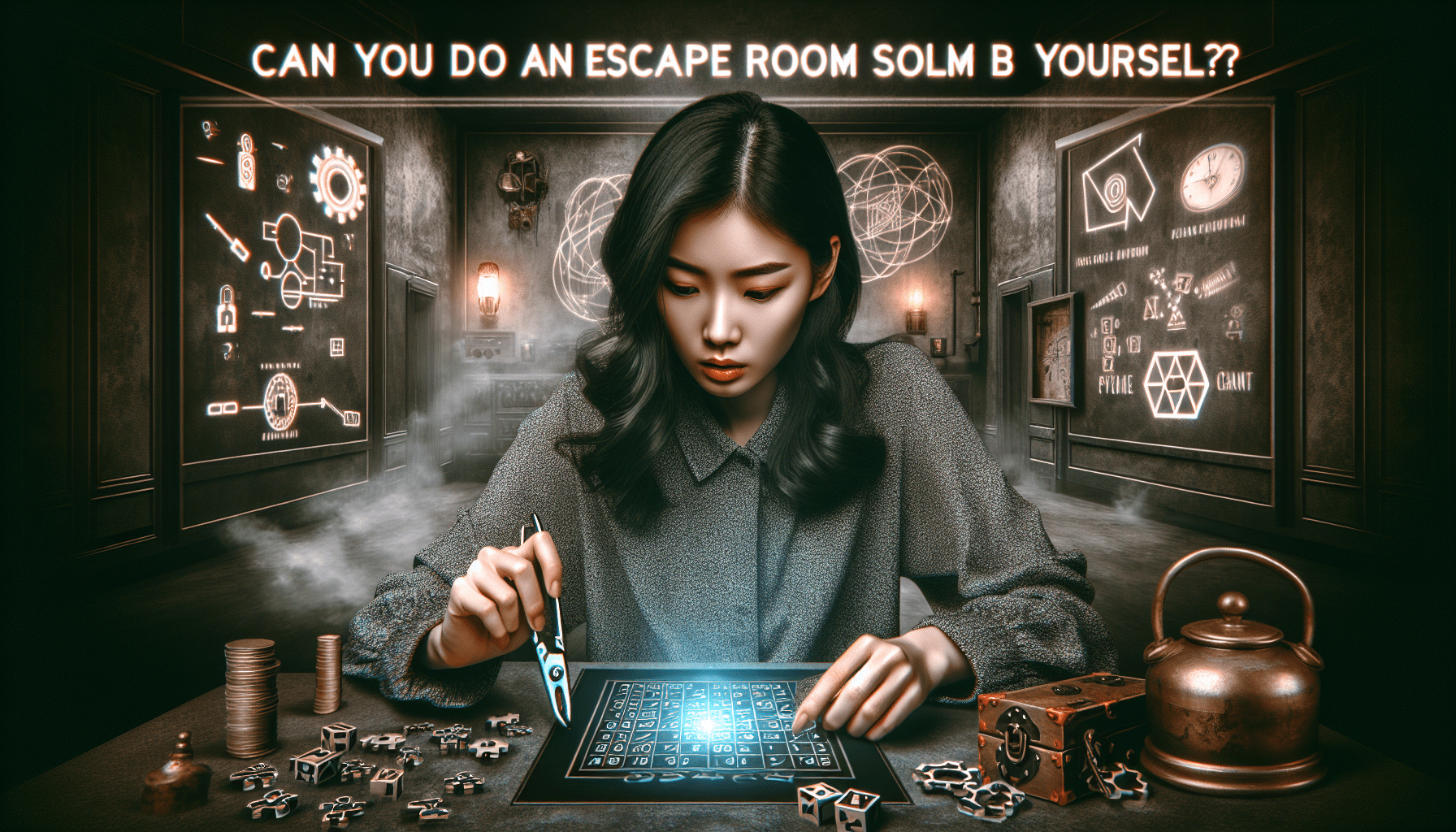Imagine yourself locked in a mysterious room filled with puzzles, clues, and an impending sense of urgency. As you search for a way out, your heart races with excitement. But wait, there’s a twist – you’re on your own. Can you conquer this thrilling challenge solo? In this article, we will explore the possibility of taking on an escape room all by yourself. So grab your thinking cap and get ready for an adventure like no other!
Benefits of Doing an Escape Room Alone
Full Control of the Experience
When you choose to do an escape room alone, you have full control over the entire experience. You can set the pace, choose which puzzles to tackle first, and decide how to allocate your time and resources. This level of control allows you to fully immerse yourself in the game and make decisions without any external influences. It’s a great opportunity to challenge yourself and test your problem-solving skills.
Challenge Yourself
Doing an escape room alone presents a unique challenge that can be incredibly rewarding. Without the support of a team, you are solely responsible for solving all the puzzles and riddles within the time limit. This forces you to push your boundaries and think on your feet. As you navigate through the room and confront challenges alone, you will gain a sense of accomplishment and satisfaction that comes from overcoming obstacles independently.
Develop Problem-Solving Skills
Engaging in an escape room alone is an excellent way to develop and sharpen your problem-solving skills. With no one else to rely on, you must utilize your critical thinking abilities to tackle each puzzle. This solitary experience allows you to dive deep into your own thought processes and explore various strategies. Over time, you’ll find yourself becoming more adept at analyzing problems, thinking creatively, and finding innovative solutions.
Improved Decision Making
When you’re alone in an escape room, every decision rests on your shoulders. This immersive experience provides a valuable opportunity to improve your decision-making skills. With no one to consult or debate with, you must trust your instincts and make quick, calculated choices. This can be a powerful exercise in developing your ability to make sound judgments, both under pressure and in a time-sensitive environment.
Improved Communication Skills
While it may seem counterintuitive, doing an escape room alone can actually improve your communication skills. Although you won’t be interacting with others during the game, the process of analyzing clues, solving puzzles, and deciphering codes requires clear and concise thinking. By practicing effective self-communication, you’ll become more proficient at articulating your thoughts, organizing information, and understanding the context of the challenges you face.
Challenges of Doing an Escape Room Alone
Limited Resources
One of the main challenges of doing an escape room alone is having limited resources at your disposal. In a team setting, members can divide tasks, share information, and collaborate on solving puzzles. As a solo player, you only have your own skills, knowledge, and physical abilities to rely on. This can make certain tasks more difficult and limit the approaches you can take to overcome obstacles.
Lack of Collaboration
Collaboration is a fundamental aspect of escape room experiences, and doing it alone means missing out on the benefits of teamwork. When working in a group, individuals can bounce ideas off each other, share different perspectives, and come up with creative solutions through collaboration. Without this interaction, you may find yourself missing out on the collective intelligence that a group can bring to the table.
Difficulty in Solving Certain Puzzles
Escape rooms often include puzzles that require multiple people to work together to solve. These puzzles can be difficult or even impossible to solve alone, as they may require physical coordination, simultaneous actions, or the distribution of tasks among several individuals. As a result, you may encounter certain puzzles that prove challenging or unsolvable when attempting an escape room alone.
Time Constraint Challenges
Escape rooms typically have a time limit, adding an element of urgency and excitement to the experience. When tackling an escape room alone, managing the available time effectively becomes even more critical. Without the support of a team, you may find it more difficult to complete tasks within the given time frame. It’s crucial to stay organized, prioritize tasks, and avoid getting overwhelmed by the pressure of the ticking clock.

Tips for Successfully Completing an Escape Room Alone
Choose the Right Difficulty Level
When doing an escape room alone, it’s essential to select a difficulty level that aligns with your skills and experience. Starting with a room that is too challenging may lead to frustration and a less enjoyable experience. Conversely, choosing a room that is too easy may not provide enough of a challenge. Consider your past escape room experiences, problem-solving abilities, and personal preferences when deciding on the appropriate difficulty level.
Utilize Your Strengths
As a solo player, it’s crucial to identify your strengths and leverage them during the escape room experience. Whether you excel at deciphering codes, solving riddles, or identifying patterns, focusing on your individual skills can give you an advantage. By playing to your strengths, you can enhance your chances of successfully completing the room and feel a sense of accomplishment in utilizing your unique abilities.
Stay Organized
Being organized is key to effectively tackling an escape room alone. Take the time to familiarize yourself with the layout of the room, the clues provided, and any available resources. Keep track of the information you gather and create a system for organizing your thoughts and clues. This will help you stay focused, avoid confusion, and ensure that you make the most of the time you have.
Manage Time Effectively
With limited time available, time management is crucial for successfully completing an escape room alone. Break down the tasks and allocate time for each puzzle or challenge accordingly. Stay aware of the time remaining and adjust your focus and strategy if necessary. Remember to prioritize difficult tasks and avoid spending too long on a single challenge. Effective time management will help prevent you from feeling rushed or overwhelmed by the ticking clock.
Think Outside the Box
When attempting an escape room alone, thinking outside the box becomes even more essential. Embrace creativity and explore unconventional approaches to solving puzzles. Sometimes, the solution may not be apparent at first, but with a fresh perspective and a willingness to think differently, you may uncover hidden connections or alternative solutions that lead to progress. Be open to trying new strategies and embrace the unexpected.
Ask for Hints
Don’t be afraid to ask for hints if you find yourself stuck or struggling to make progress in an escape room alone. Escape room operators understand the challenge of solo play and often provide the option for hints or clues. Asking for assistance when needed can help you overcome obstacles and keep the game moving forward. Remember, the goal is to enjoy the experience, and sometimes a small nudge in the right direction can make all the difference.
Prioritize Tasks
In an escape room alone, it’s crucial to prioritize tasks effectively to make the most efficient use of your time and resources. Start by focusing on the puzzles that seem the most attainable or have clear connections to other elements in the room. By tackling the more manageable challenges first, you can gain momentum and build confidence as you progress through the game. Prioritization will prevent you from getting overwhelmed and increase your chances of success.
Stay Calm and Focused
It’s natural to feel some level of pressure or frustration when attempting an escape room alone, particularly when faced with challenging puzzles or time constraints. However, it’s important to stay calm and focused throughout the experience. Taking deep breaths, maintaining a positive mindset, and reminding yourself of the fun and excitement can help you stay on track and think clearly. Don’t let frustration or stress hinder your ability to think critically and enjoy the game.
Strategies for Solving Escape Room Puzzles Alone
Start with Observing and Scanning
When you enter an escape room alone, take a moment to observe your surroundings and scan the room for any clues or hints that may be hidden in plain sight. Pay attention to details, patterns, or anything that seems out of place. By conducting a thorough visual examination, you may uncover crucial information or identify objects that are essential for solving puzzles later on.
Identify Patterns and Connections
Escape rooms often incorporate puzzles that require you to identify patterns or make connections between seemingly unrelated items or clues. As a solo player, take your time to analyze the available information and look for any patterns that may emerge. Keep an open mind and consider different scenarios or interpretations. Making these connections can lead to breakthroughs and progress through the room.
Break Down Complex Puzzles
Some escape room puzzles can appear complex or overwhelming at first glance. As a solo player, it’s important to break down these puzzles into smaller, more manageable components. Look for any clues or elements within the puzzle that you can tackle independently. By deciphering individual parts, you can slowly unravel the complexity of the overall puzzle and work towards a solution.
Use Logical Deduction
Logical deduction is a powerful tool when attempting an escape room alone. Analyze the available clues and use deductive reasoning to eliminate potential options or solutions. Think critically about cause and effect, and consider the logical consequences of your actions or decisions. By eliminating unlikely possibilities and narrowing down your focus, you can make informed and calculated choices that move you closer to solving the puzzles.
Team Up with Inanimate Objects
Inanimate objects within an escape room can be valuable allies for solo players. Look for items that can assist you in solving puzzles or provide additional information. Some puzzles may require physical manipulation or interaction with objects in the room. Be observant and creative in utilizing the items at your disposal to unlock new clues or reveal hidden compartments.
Keep Track of Clues and Information
With no teammates to rely on for backup, it’s essential to keep track of all the clues and information you encounter. Maintain a systematic approach to documenting anything significant. Whether it’s through note-taking, sketching, or using a smartphone app, develop a method that works for you. By organizing and referencing these clues, you can avoid confusion, notice patterns more easily, and keep an overview of the progression of the game.
Test Your Theories
When attempting to solve escape room puzzles alone, it’s important to test your theories and hypotheses. Use the information you’ve gathered to form potential solutions and then put them to the test. Experiment with different combinations, interactions, or sequences to see if your ideas yield the desired results. Engaging in trial and error is a valid strategy as long as you learn from each attempt and adapt your approach accordingly.
Utilize the ‘Reset’ Option
Many escape rooms offer a “reset” option that allows you to start again if you become stuck or make a mistake. As a solo player, don’t hesitate to use this option if necessary. It can be a valuable tool for retracing your steps, reevaluating your approach, or undoing any accidental missteps. Resetting the room can provide a fresh start and an opportunity to approach the puzzles from a different angle, potentially leading to a breakthrough.

Recommended Types of Escape Rooms for Solo Players
Narrative-based Escape Rooms
For solo players looking for an immersive and story-driven experience, narrative-based escape rooms are an excellent choice. These rooms often feature engaging narratives that unfold as you progress through the puzzles. By playing alone, you can fully immerse yourself in the story, absorb the details, and become the protagonist of your own adventure.
Skill-based Escape Rooms
Certain escape rooms focus on individual skills, such as physical agility, logic, memory, or problem-solving abilities. These skill-based escape rooms can be particularly well-suited for solo players looking to test and refine specific abilities. By selecting a room that aligns with your strengths or allows you to develop new skills, you can have a satisfying and personally tailored experience.
Mystery and Detective-themed Escape Rooms
Mystery and detective-themed escape rooms often require players to unravel a complex storyline and solve intricate puzzles to crack the case. As a solo player, these types of rooms can provide a thrilling and engaging experience. You can fully immerse yourself in the role of the detective and challenge your deductive reasoning, critical thinking, and problem-solving abilities to solve the mystery alone.
Alternative Solo Escape Room Experiences
Virtual Reality (VR) Escape Rooms
If you’re craving a solo escape room experience from the comfort of your own home, virtual reality (VR) escape rooms offer an immersive and convenient alternative. With VR technology, you can step into a virtual world and navigate through puzzles and challenges on your own. These experiences often combine elements of puzzle-solving, exploration, and storytelling, providing a unique and interactive solo adventure.
Mobile Escape Room Apps
Mobile escape room apps provide another convenient option for solo players. With a variety of puzzle-solving games available on smartphones and tablets, you can dive into a portable escape room experience anytime and anywhere. These apps often offer a range of difficulty levels and themes, allowing you to choose a challenge that suits your preferences and skill level.
Escape Room Puzzle Boxes
Escape room puzzle boxes offer a tactile and hands-on solo experience. These physical puzzles usually come in the form of wooden or metal boxes, filled with hidden compartments, locks, and secret mechanisms. By manipulating and solving the puzzles within the box, you can unlock its contents and progress through the game. Puzzle boxes provide a unique challenge that can be enjoyed at your own pace and in the comfort of your own space.

Benefits of Joining a Group for an Escape Room Experience
Enhanced Collaboration and Teamwork
One of the primary benefits of joining a group for an escape room experience is the opportunity for enhanced collaboration and teamwork. Working together with others can stimulate creativity, foster shared problem-solving, and provide different perspectives and approaches to challenges. The collective intelligence of a group can often yield innovative solutions and lead to a more successful escape.
Diverse Skill Sets
An essential advantage of participating in an escape room with a group is the diverse range of skill sets that each member brings to the table. Individuals may have expertise in different domains, such as logical reasoning, puzzle-solving, or physical agility. By combining these diverse skill sets, teams can tackle a wide variety of challenges more effectively than a solo player.
More Resources and Perspectives
A group participating in an escape room has access to more resources and perspectives than a solo player. Different individuals may notice different clues, think differently, or possess unique knowledge that can contribute to the overall progress of the group. By pooling resources and sharing information, teams can uncover hidden connections, solve puzzles faster, and make better-informed decisions.
Shared Responsibilities and Workload
When participating in an escape room as part of a group, responsibilities and workload can be shared among team members. This can alleviate the pressure and ensure a more even distribution of tasks. By working together, the group can divide and conquer, allowing individuals to focus on specific puzzles or challenges while knowing others are tackling different parts of the room.
Shared Excitement and Fun
Completing an escape room with a group brings with it a sense of shared excitement and fun. The experience of working together, solving puzzles, and overcoming obstacles creates a bond and a shared sense of accomplishment. Sharing these memorable moments with others can enhance the overall enjoyment of the escape room and create lasting memories.
Conclusion
Whether you choose to tackle an escape room alone or with a group, both experiences offer unique challenges and benefits. Doing an escape room alone allows for full control of the experience, challenges your problem-solving skills, and fosters improved decision-making and communication abilities. However, it also presents challenges such as limited resources, lack of collaboration, and difficulty in solving certain types of puzzles. To successfully complete an escape room alone, it’s essential to choose the right difficulty level, utilize your strengths, stay organized, manage time effectively, think outside the box, ask for hints when needed, prioritize tasks, and remain calm and focused.
There are various strategies to solve escape room puzzles alone, including starting with observing and scanning, identifying patterns and connections, breaking down complex puzzles, using logical deduction, teaming up with inanimate objects, keeping track of clues and information, testing theories, and utilizing the ‘reset’ option if available. When it comes to choosing escape rooms for solo players, narrative-based rooms, skill-based rooms, and mystery and detective-themed rooms are recommended.
Alternatively, solo escape room experiences can be enjoyed through virtual reality (VR) escape rooms, mobile escape room apps, or escape room puzzle boxes. On the other hand, joining a group for an escape room experience offers enhanced collaboration, diverse skill sets, more resources and perspectives, shared responsibilities and workload, and shared excitement and fun. Ultimately, it’s important to consider your preferences and objectives when deciding between solo and group escape room experiences, and to explore both options to fully appreciate the unique challenges and benefits each offers.
